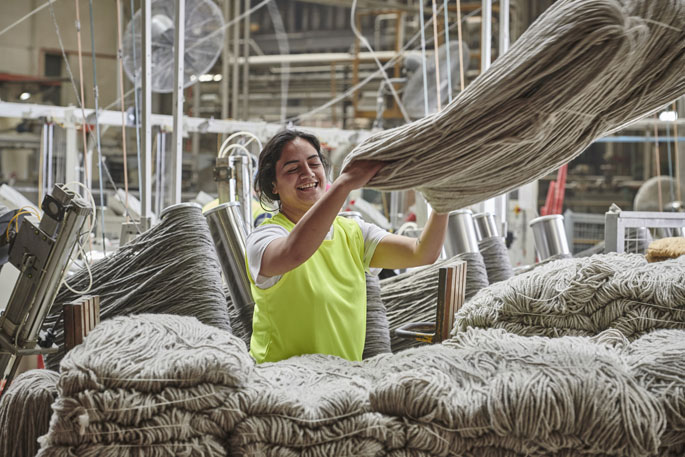A three-year research study into the perceptions of wool has found efforts to build the industry's sustainability credentials is transforming how millennial consumers perceive the fibre.
Industry experts say the perceptual change is removing significant barriers to the growth of the domestic and export wool markets.
The nationwide Bremworth study, which has tracked changes in attitudes over the past three years, also shows the perception of wool carpet as having a higher cost, when compared to synthetic alternatives, is becoming less of a barrier for most consumers.
The new study found wool is increasingly recognised as environmentally friendly by over three quarters (77 per cent) of those surveyed and sustainable by more than two thirds (69 per cent) of respondents.
The research also found health and safety of home flooring is now a key driver of purchase for consumers with almost a third (31 per cent) of those Kiwi households surveyed living with someone with allergies.
Wool is seen as healthier (66 per cent), more fire resistant (60 per cent) and more allergy friendly (45 per cent) than synthetic alternatives.
While latest Government data shows the value of New Zealand's wool product exports, of which most is carpet, has fallen by 44 per cent over the past six years, there are positive signs for the industry with forecasts projecting a 10 per cent increase in export revenue for 2023.
Bremworth CEO Greg Smith says while wool was once ubiquitous on the floors of Kiwi homes, over the past two decades synthetic flooring has become dominant in the market.
He says for the first time the local industry is now faced with building awareness of wool carpet across a segment of millennial homeowners who have not grown up with it in their house as children.
'What we know from the research is that half of those in the market for renovating or refurbishing their home are now in the millennial age bracket.
'This is a market segment who is looking to wool for a range of reasons that weren't priorities for the generations that preceded them.
'We also know that millennials spend time researching products before buying and choose brands that align with their ethical beliefs and values. The length of life of a product, sustainability and environmental impact are also factors they take into consideration before making a purchase.
'We also recognise that if we can't effectively educate domestic consumers on the benefits of wool in a country where it is produced, we will have little chance of growing our offshore markets - the research has shown us that the industry is making significant advances on this front every year.”
Smith says their learnings from the first 12 months moving away from synthetics to produce only wool carpet have wider repercussions for other New Zealand manufacturers and exporters.
He says the company now focuses on positioning wool as a premium residential offering in offshore markets rather than securing large-scale commercial contracts which were heavily price driven.
'Working with wool is a significantly different product to synthetics as it requires constant adaptation by skilled artisans to allow for the natural variations in colour of raw material - which are driven by seasonal weather patterns and other factors.
'As a result we are now focused on exporting a high value, high quality product at a significantly greater margin to target the top end of the international residential property market.
'We have also increased our local employment levels by four per cent over the past year - with the new business model demonstrating there is an upside for our economy as Kiwi manufacturers work to become more sustainable.
'Historically, cost has been a key differentiator in the local market, however that was before there was widespread recognition of the environmental impact synthetic or plastic products will create for our current and future generations.
'We can see that over the past year the focus on price has dropped significantly and is now only a barrier for less than a quarter (23 per cent) of consumers.
'Where we do need to focus on however is building greater awareness of wool with 27 per cent of respondents unaware of what synthetic carpet is made from - which can be nylon, polyester and polypropylene,” he says.
Smith says the study also shows the pandemic-led growth in renovations may be tailing off with fewer Kiwis interested in replacing their flooring. 'While carpet remains the preferred flooring choice for 70 per cent, there are some indications that fewer people are looking to refurbish their home over the coming year.
'Interest in purchasing vinyl, laminate, tile or wood flooring has dropped to as low as 14 per cent - which means the agricultural industry can focus on further educating consumers on the benefits of wool over synthetics to grow market share.”



0 comments
Leave a Comment
You must be logged in to make a comment.